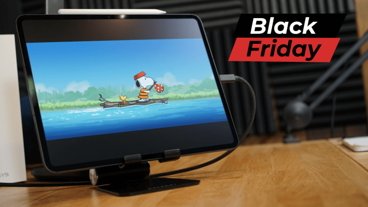Judges cannot invoke "common sense" when considering the validity of a patent, the U.S. Court of Appeals for the Federal Circuit ruled on Wednesday, impacting a case pitting Arendi S.A.R.L. against Apple and Google.
A U.S. Patent and Trademark Office review board made a mistake when it used only "common knowledge and common sense" to invalidate an Arendi patent, the Court of Appeals said according to Bloomberg. The court argued that such sentiments "cannot be used as a wholesale substitute for reasoned analysis and evidentiary support," overturning the prior ruling.
The patent in question involves the way a computer app displays a document while searching for outside infomation, a given example being a name detection system that finds and inserts associated addresses.
Arendi has leveled infringement accusations against a host of companies, another one being Samsung. To undermine Arendi, defendants asked the USPTO to review the patent, scoring an apparently brief victory.
In July, however, the appeals court did uphold a USPTO decision to invalidate a second patent. Other challenges are still awaiting USPTO review, and will have to be resolved before Arendi's lawsuits can continue.
 Roger Fingas
Roger Fingas








 Wesley Hilliard
Wesley Hilliard
 Marko Zivkovic
Marko Zivkovic
 Christine McKee
Christine McKee

 Malcolm Owen
Malcolm Owen


 Amber Neely
Amber Neely








17 Comments
Arrrrrgh! Good grief. It is laughable that a judge dismisses common sense as an argument for anything related to patents.
Makes sense. All good ideas (patents) seem obvious or "common sense" AFTER you see it. It's why people go "why didn't I think of that?" when they see something new (and usually simple/straightforward).
This patent sounds like Mail merge which has been around since the early 90's. MS has had this as part of Word for a very long time, you can put in a text field that word would read and then look at an excel or database file an insert the appropriate address. I use to use this to do xmas letters and cards why back.
http://patft.uspto.gov/netacgi/nph-Parser?Sect1=PTO2&Sect2=HITOFF&p=1&u=%2Fnetahtml%2FPTO%2Fsearch-bool.html&r=1&f=G&l=50&co1=AND&d=PTXT&s1=Arendi&OS=Arendi&RS=Arendi
Just the first of several from Arendi (Luxembourg), this one filed in 2010. You have to scroll through several screens of references before you get to the description. Here's one of the good ones that's been in use forever:
"In recent years, with the advent of programs, such as word processors, spreadsheets, etc. (hereinafter called "word processors") and operating systems, such as WINDOWS.TM. operating system, MACINTOSH.TM. operating system, etc., users may require retrieval of information, such as name and address information, etc., for insertion into a document, such a letter, fax, etc., created with the word processor or for contact management at the operating system level. Typically, the information is retrieved by the user from an information management source external to the word processor, such as a database program, contact management program, etc., or from the word processor itself, for insertion into the document. Examples of such word processors are WORD.TM., NOTEPAD.TM., EXCEL.TM., WORDPAD.TM., WORDPERFECT.TM., QUATROPRO.TM., AMIPRO.TM., etc., and examples of such information management sources are ACCESS.TM., OUTLOOK.TM., ORACLE.TM., DBASE.TM., RBASE.TM., CARDFILE.TM., etc.
However, the information in the database must constantly be updated by the user. This requires the user to learn how to use and have access to the database. In this case, a change in the information, such as change in an address or a name, etc., requires the user of the word processor to implement this change in the database, or alternatively, the change is made to the database centrally by a database administrator."
Sound familiar to a whole lot of existing software applications? I guess the USPTO still uses a typewriter so they wouldn't know anything about word processing programs interacting with databases, which are updated by users.